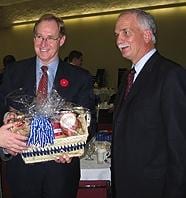A week after his political appointment caused many gays and lesbians to cringe, the new CEO of the Canadian Museum for Human Rights isn’t showing any signs of atonement.
“I’m reluctant to keep driving back to the past,” said Stuart Murray, from the museum’s temporary office space in downtown Winnipeg.
But Murray’s past is exactly what gay and lesbian critics want him to discuss. Before Stephen Harper put him in charge of Canada’s federally-funded human rights museum, set to open in 2012, Murray was leader of Manitoba’s Progressive Conservative Party.
As leader, he and his caucus voted against same-sex adoption rights.
Why did he oppose the NDP government’s legislation? Would he vote the same way today? Does he have any regrets? Has he learned any lessons? Is he sorry? Even after inviting Xtra.ca over for a chat, Murray’s still not answering any of those questions.
“You’re asking me to look in the rear-view mirror,” said Murray. “Going back in time is just not possible.”
In 2002, under pressure from gay and lesbian activists, Manitoba’s NDP government introduced a bill giving same-sex couples the right to adopt.
Originally, Murray said his party supported the idea. At the time, he told the Winnipeg Free Press, “For one gay person to be able to adopt (as a single person) — it just seems that the next logical opportunity is to expand that and to allow same-sex couples. Loving parents, I believe, raise good children … you can’t convince me that one person can love better than another person.”
A few months later, Murray said he would allow a free vote on the issue. “I’m quite comfortable in our caucus if they want to have a free vote,” he told the Free Press. “When you get to issues that have a moral sort of background to them, it’s important that we’re sensitive.”
Finally, when the NDP’s legislation came to a vote, Murray and the rest of his caucus stood against it. That day, he said, “Although I said as an individual I support same-sex adoption, there are a number of Manitobans who have a different opinion. The majority of people who I spoke to were not in favour of this and I felt we needed to stand up for them.”
This week, Murray told Xtra.ca that his personal view on adoption rights hasn’t changed. “I don’t think that heterosexual people have a monopoly on love for children,” he said. “It is the inherent right of the child to be loved, and if they’re loved by two men, two women, a man and a woman, a single man, or a single woman, the issue should be love for the child.”
But he’s reluctant to talk about his party’s vote on the issue, except to say this: “As we were getting ready for that vote, I became very aware that there were going to be serious issues if I took the stand I believed in.”
The Canadian Museum for Human Rights hasn’t made any formal announcements about its content, causing many gay rights leaders — including Helen Kennedy of Egale Canada — to fear that queer history might be overlooked.
Murray insists we’re in. But considering his flip-flop in 2002, why should we believe him?
“I think there’s a danger in trying to equate party politics with what’s going to happen in the Canadian Museum for Human Rights,” he said.
According to Murray, the museum is a team project, with many managers and curators deciding what gets included. But he also admits that, as CEO, the buck stops with him.
What if Murray wants queer content, but the majority of his employees don’t?
“Clearly there’s no place for hatred,” he said, “but there has to be room for controversy, for different pieces of opinions.”
Throughout the interview, Murray said that he’s committed to meeting with queer community members early — and often.
“What I’m saying very forcefully is, ‘Let’s work together.’ Relationships are two-way things. I’ll do everything I possibly can and I expect the community, rather than just sit with its arms folded, to say, let’s give each other a hug.”
The interview ended with a handshake, and an invitation from Murray. “Let’s meet again.”

 Why you can trust Xtra
Why you can trust Xtra


